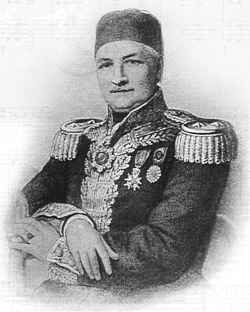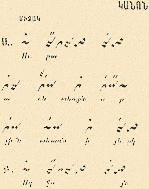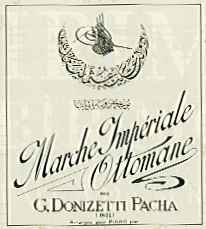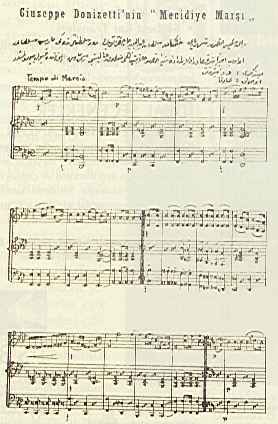DONIZETTI PAŞA
 If you are looking for an answer to Rossinis Il Turco in Italia
opera that is Guiseppe Donizetti Paşa, Un Italiano in Turchia. If you are looking for an answer to Rossinis Il Turco in Italia
opera that is Guiseppe Donizetti Paşa, Un Italiano in Turchia.
Guiseppe Donizetti was born in Bergamo on 6 November 1788, the elder
brother of Gaetano Donizetti, the famous opera composer. His first music
teacher was his uncle Gorini. He applied to enter the Pra school of music, but was
rejected because he had passed the age limit. A teacher at the at the school, the German
composer Mayr, was so sorry to see the boys talent wasted that he gave
him private lessons. In 1808 Donizetti was called up into the army and became a flutist in
the band of the Seventh Regiment. He participated in all Napoleons wars in Austria and
Spain. When the emperor abdicated at Fountainebleau and was exiled to the Island of Elba,
Donizetti was one of the small band whose members volunteered to accompany him. In Elba he
married Angela Tondi. He remained with Napoleon when he secretly returned to France and
was with him at the Battle of Waterloo. After Napoleons defeat and confinement on St.
Helena in 1815 Donizetti returned to Italy.
Meanwhile in Turkey Sultan Mahmud II had been biding his time before
crushing the reactionaries who opposed radical reform in the country. In 1826 the time
came and he destroyed the Janissary Corps, establishing a modern army in its place. The
janissary wehter band was replaced by a western style military band made up young men from
the Imperial Palace School, and a Frenchman named Mangnel appointed as
the bands conductor. Mangnel proved unequal to the task, however, and Commander in
Chief Hüsrev Paşa asked the Marquis Grappolo, Sardinian ambassador to Istanbul, to help
find a replacement. Donizettis name was put forward by the Council of Turin, and he was
accepted for the post on 7 November 1827. He arrived in Istanbul on 17 September 1828 and
was received by the sultan. He set to work immediately and quickly established the
Imperial Band.
 At that time the Hamparsum
notation was used in Turkey (see picture to the left), and Donizetti first set about
learning this system so as to teach the musicians the western notation system. With the
help of an English naval captain, Adolphus Slade, who was then serving in the Ottoman
Empire, new instruments were imported from Europe. In just five or six months Donizetti
had trained his band so well that they were ready to perform before the sultan. At that time the Hamparsum
notation was used in Turkey (see picture to the left), and Donizetti first set about
learning this system so as to teach the musicians the western notation system. With the
help of an English naval captain, Adolphus Slade, who was then serving in the Ottoman
Empire, new instruments were imported from Europe. In just five or six months Donizetti
had trained his band so well that they were ready to perform before the sultan.
During all this time Doizetti and the new band were with the new army, as was Mahmud
II, who spent the winter of 1828-1829 at the army barraks in Rami west of Istanbul, and
the summer of 1829 at the army encampment on Tarabya Meadows beside the Bosphorus. By the
time of their first royal performance, the band had learnt a repertoire consisting largely
of compositions by Rossini.
 Donizetti
composed the Mahmudiye March for Mahmud II, and after his death composed
the Mecidiye March for his son Sultan Abdülmecid, who came to the throne
in 1839 (in 1847) Franz Liszt composed a paraphrase based on the Mecidiye
March and presented it to the sultan). Donizetti was presented with a diamond studded
tobacco box bearing Abdülmecids monogram as a reward for his composition. In 1841
Donizetti was promoted to the rank of colonel and given the decoration reserved for
infantry officers, a sword and the title of paşa. He subsequently received a third class
Nişan-ı Ali medal. Donizetti
composed the Mahmudiye March for Mahmud II, and after his death composed
the Mecidiye March for his son Sultan Abdülmecid, who came to the throne
in 1839 (in 1847) Franz Liszt composed a paraphrase based on the Mecidiye
March and presented it to the sultan). Donizetti was presented with a diamond studded
tobacco box bearing Abdülmecids monogram as a reward for his composition. In 1841
Donizetti was promoted to the rank of colonel and given the decoration reserved for
infantry officers, a sword and the title of paşa. He subsequently received a third class
Nişan-ı Ali medal.
Meanwhile Donizetti received various awards for his music in Europe. The king of
Sardinia presented him with a decoration and a watch, and the French government with the
Legion dHonneur.
Donizetti Paşa lived in a large house in Asmalı Mescid allocated by the government,
and towards the end of his life gave up conducting the band although he remained its
impressario. He lived in Istanbul until his death on 12 February 1856, and was given a
magnificent military funeral.
 Donizetti
Paşas younger brother Gaetano was proud of his successful musical career in Turkey,
although he was sad at the separation that this entailed. He always referred to Donizetti
Paşa as Il Turco, both in conversation and in letters. Donizetti Paşa may have
been overshadowed by his brothers reputation in Europe, but in Turkey he is the one who
is best remembered, not so much for his compositions but his key role in introducing
western music side by side with classical music. Donizetti
Paşas younger brother Gaetano was proud of his successful musical career in Turkey,
although he was sad at the separation that this entailed. He always referred to Donizetti
Paşa as Il Turco, both in conversation and in letters. Donizetti Paşa may have
been overshadowed by his brothers reputation in Europe, but in Turkey he is the one who
is best remembered, not so much for his compositions but his key role in introducing
western music side by side with classical music.
It is ironic that the tradition of western martial music which Donizetti introduced had
itself been strongly influenced by Turkish military music. Turkish armies had had military
bands since the middle ages and possibly earlier, and many of their percussion instruments
had been borrowed by the west over the centuries. The bass drum, for example, was known as
the Turkish drum and was played in Turkish style until well into the 19th century. The
period of greatest impact was the 18th century, when bands modeled on the janissary bands
were first established in Europe, and European rulers sent their bandmasters to study the
art of military music in Istanbul.
- Source:
- An italian in Istanbul - DONIZETTI PAŞA
By Mehmed Reşit Erol
SKYLIFE 02/98
|